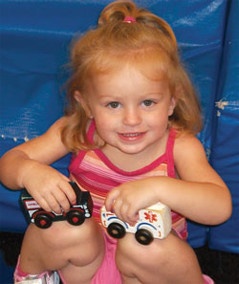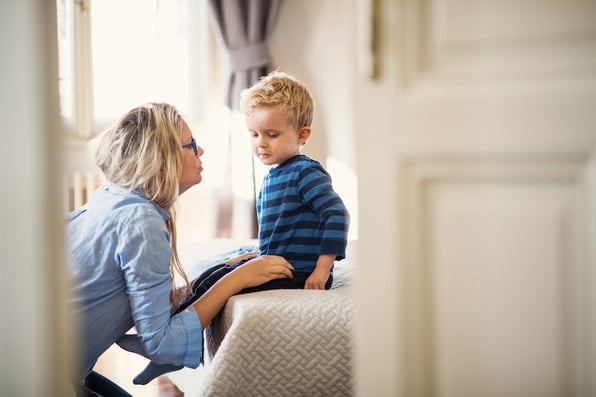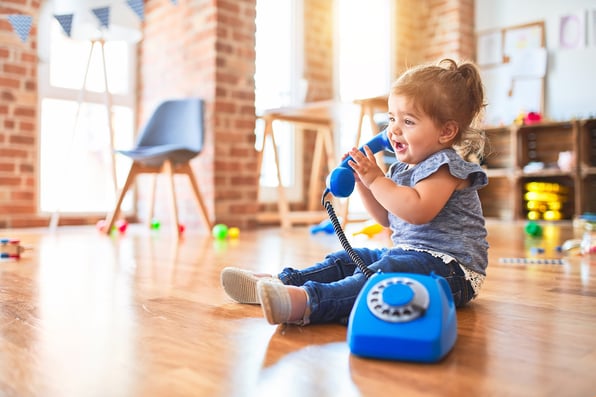 Children can seem to race through their toddler years, and the speed of their growth and skill development between 18 and 36 months can leave parents panting to keep up.
Children can seem to race through their toddler years, and the speed of their growth and skill development between 18 and 36 months can leave parents panting to keep up.
Overall, toddlers learn by playing and need both structured and unstructured play to learn, practice and master new skills. The mastery of each new skill allows the child to progress to the next level of development, going through a number of developmental stages on their way to becoming accomplished 4-year-old children.
At a high level, between the ages of 18 and 20 months, children engage primarily in exploratory play using all their senses — taste, touch and smell — to explore their world. Toddlers watch other children playing and may begin to play next to other children or imitate another child’s actions; but at this age, play is solitary, not cooperative.
Parents can encourage their toddler’s growth and development to explore by providing toys with a variety of textures, colors, sounds and sizes. Guided play in which parents demonstrate how to play with a toy is appropriate at this age, but toddlers must also be allowed to explore toys in their own way.
From 21 to 24 months, toddlers engage in a great deal of imitative play. They watch and copy the way other children play and delight in imitating the actions of family members. Through imitation, children begin to explore relational play, using objects as they are intended to be used.
This can also be when toddlers begin to participate in cooperative play. An example of this is when they toss a ball back and forth — perhaps with a parent or sibling. Early on, cooperative play can come in short bursts, but then it will last longer.
Three Types of Toddler Development Stages
As HealthyChildren.org points out, toddlers go through three types of development: physical, social and cognitive. They list physical skills as the following: walking alone, pulling toys behind them, standing on tiptoes, learning how to run, and kicking a ball. These aren’t the only types of physical development that can take place, but it’s a good overview of how toddlers grow in skill.
Social skills include, as discussed above, a toddler’s ability to imitate others’ behaviors and become more enthusiastic about spending time with other children. Through this process, they become increasingly aware of being a separate person, separate from other people around them.
As a toddler develops, they also gain cognitive skills. They learn how to sort objects by shape and color, for example, find hidden objects (even those that are two or three levels deep), and play make-believe games.
Language Development “Explosion”
“Just like new walkers eventually become swift runners and clambering climbers, new talkers begin to make great strides in language development at around 18 months.” (WhatToExpect.com)
At the age of 1, a baby may only know a few words. Fast forward by a couple of years and that same child may know 1,000 words — perhaps 2,000. This is also when the toddler will start to put a couple of words together to make basic sentences.
This doesn’t mean, of course, that a parent will understand all of their toddler’s words, especially when the words are newly learned. A toddler may have trouble with certain consonants and consonant blends (so, “do dat?” may mean “Do that?”). Usually, though, parents and consistent caregivers will quickly catch on to what a toddler means.
How Horizon Education Centers Can Help
So, when are toddlers constantly on the move? Many parents would say “any time they’re awake” and there’s plenty of truth in that response. Our skilled toddler care team is well aware of how much engagement toddlers need to optimally develop, and that’s what we provide in low children-to-caregiver ratios.
We help parents to prepare their toddlers for preschool with positive peer interaction and valuable life skills. More specifically, we provide:
- Cognitive development activities
- Preschool readiness
- Self-help skills
- Physical and emotional development activities
- Language and literacy skills
- Physical health activities
We invite you to explore our centers online today!







